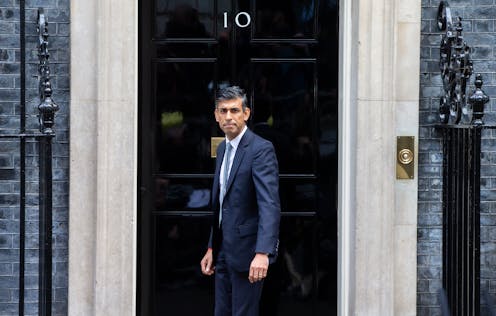Source: The Conversation (Au and NZ) – By Rob Manwaring, Associate Professor, Politics and Public Policy, Flinders University
The United Kingdom heads to the polls on July 4, and the widely expected outcome is a defeat for the British Conservative Party after 14 years in power.
In the 650-seat House of Commons, the Conservatives (more commonly the “Tories”), led by Rishi Sunak, currently hold 344 seats. The Labour Party has 205 seats, the Scottish National Party has 43, and the Liberal Democrats are on 15.
The Labour Party, headed by Sir Keir Starmer, has long led opinion polls by at least 20 points. This was cemented after the disastrous prime ministership of Liz Truss, which came to an end in October 2022.
The most recent polls indicate the Conservatives face either a significant loss of more than 200 seats, or a total bloodbath leaving them with little more than 50 seats.
Why are the Conservatives struggling?
The UK’s outmoded first-past-the-post electoral system creates highly disproportionate results. Sunak inherited Boris Johnson’s 2019 80-seat majority, but while this was 56% of the seats, the party only won 44% of the vote share.
Sunak’s campaign so far has been insipid, tetchy, flat and downbeat.
First, the Conservatives have run out of steam. A record number of Conservative MPs decided not to run.
Sunak’s early call for an election surprised and wrong-footed the party machine. A betting scandal is currently engulfing the Conservatives, reflecting a party that lacks discipline and integrity.
Candidate Craig Williams has been dropped by the Conservatives after betting on the election date, three days before Sunak announced it. The UK’s Gambling Commission is investigating up to five Conservative candidates for suspicious betting activity.
The campaign began with Sunak getting drenched by the rain outside 10 Downing Street – a fitting image for his woes.
Sunak also has a patchy record on which to campaign.
He failed to meet all five of his pledges in office. His signature policy on the Rwanda deal to “stop the boats” has met numerous legal challenges and has not taken hold.
He has also backtracked on his proposed smoking ban legislation, which makes his campaign call for “bold action” ring hollow.
And his call to introduce national service was met with derision.
Labour has problems, too
Starmer’s personal polling remains weak. He has pushed Labour to the centre, and has courted former conservatives such as pro-Brexiteer Natalie Elphicke (MP for Dover), alienating parts of the left’s rank and file.
Starmer’s policy agenda has also failed to catch the public’s imagination.
His call for “change” is vague, and crucially, he and his Shadow Chancellor Rachel Reeves (presumably soon to the UK’s first ever female Chancellor) have made fiscal restraint a central motif.
The contest outside England
In Scotland, the Scottish National Party also looks set to lose significant seats to Labour, and suffered leadership churn.
In Wales, the contest for the 32 seats largely falls on the traditional Tory/Labour axis, with some challenge to Labour’s left from Plaid Cymru (the Welsh nationalists).
In Northern Ireland, 18 seats will be contested.
Strikingly, Sinn Féin – the Irish republican party that currently holds seven UK parliamentary seats – could for the first time become Northern Ireland’s largest party, with the Unionists in disarray.
Sinn Féin’s policy of abstentionism means it will not take up its seats in Westminster; but a big win for them will be a blow for the Unionists.
A shift to multi-party politics
The return of Nigel Farage to lead Reform UK, which is polling at 15–18%, is eroding the conservative campaign.
And the Lib Dems, former coalition partners of the Tories, are expected to increase their 15 seats.
A shift to a more multi-party politics will likely emerge.
Key policy concerns for voters
The economy remains the priority issue for most voters. Despite being the sixth-largest economy in the world, the UK public is not feeling the benefits. While inflation is falling, the cost of living remains resolutely high. For the poorest people, 14 years of the Conservatives has also seen record numbers of people using foodbanks.
There are significant policy differences between the two main parties.
Labour is promising £8.6 billion (A$16.3 billion) in tax rises, which include extending VAT (a consumption tax, similar to Australia’s GST) to private school fees. It’s also targeting the tax status of non-domiciled residents, and a windfall tax on the oil and gas industry.
Sunak is under pressure to cut taxes and has said he’ll further reduce the national insurance levy that helps to fund public services such as health.
Tax remains a wounding policy area for Labour. During TV debates, the Conservatives have repeated, albeit false claims, that household budgets will face a £2,000 (A$3,800) tax hike under a Starmer government. These claims will test Labour’s nerve.
Public services in the UK are in a poor state and there are concerns current spending pledges by the two parties may mean further decline.
National Health Service waiting times for surgery are nearly three times higher than when David Cameron was prime minister in 2010.
Yet, some experts warn neither major party is putting enough resources into tackling this.
On climate change, there isn’t a significant headline difference between the major parties – Labour pledges to shift to clean energy by 2030, the Tories by 2035.
Yet, Labor has a “mission” to significantly ramp up renewables and insulation. Sunak has softened a number of his pledges, citing concerns the economic burden will fall on households.
Should Labour win – and it’s highly likely it will – the task facing a Starmer government will be stern and far-reaching, and the public impatient.
![]()
Rob Manwaring receives funding from the Australian Research Council (on a discovery grant on political parties and associated entities).
– ref. Conservatives face a bloodbath at July’s UK election. What are the key issues for voters – and what’s Labour promised? – https://theconversation.com/conservatives-face-a-bloodbath-at-julys-uk-election-what-are-the-key-issues-for-voters-and-whats-labour-promised-232173




